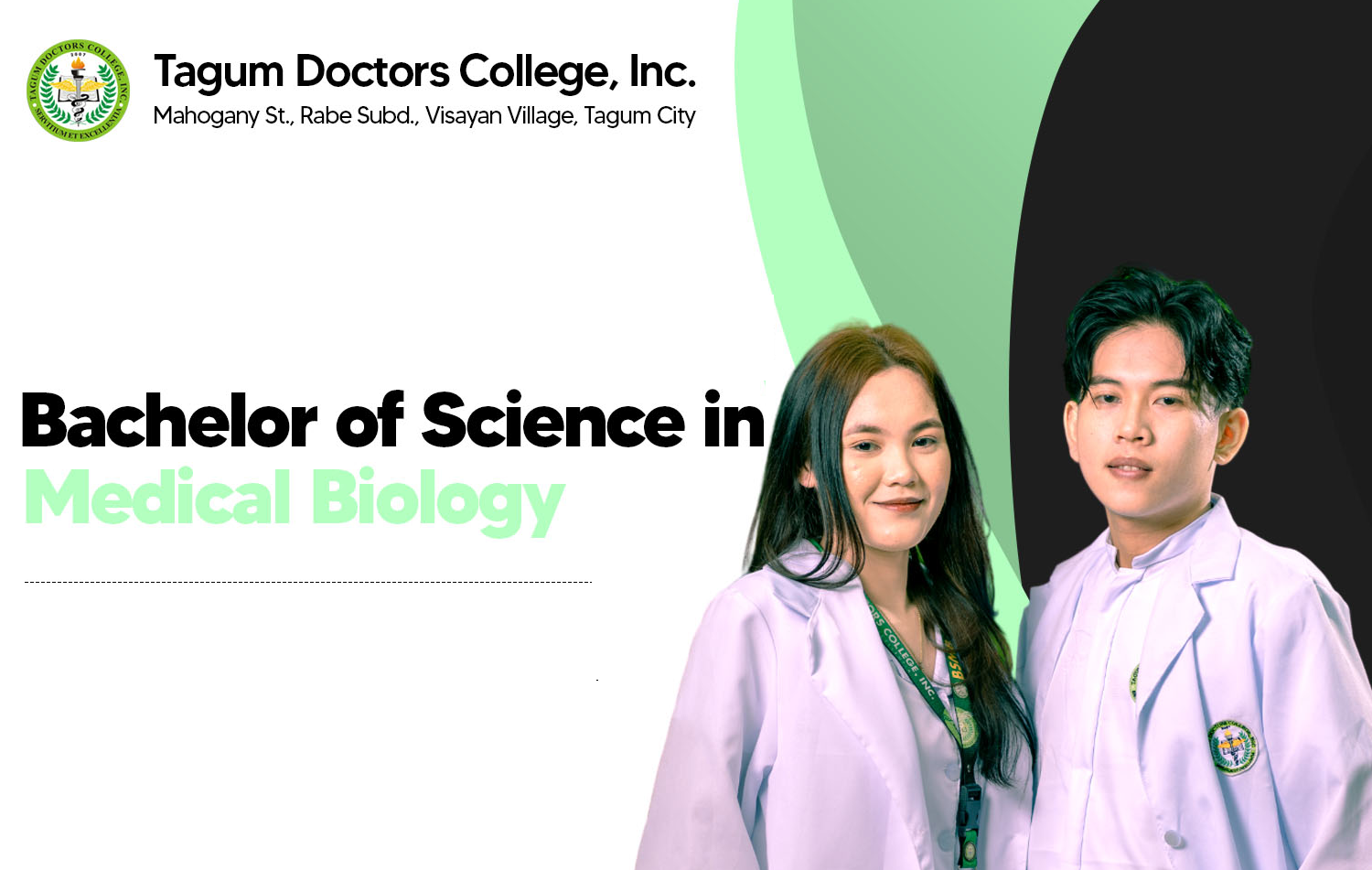Bachelor of Science in Biology

The Bachelor of Science in Biology major in Medical Biology is a four-year specialized undergraduate program of Tagum Doctors College Inc. that provides a well-rounded academic experience in the biological sciences in preparation for medical school. Thus, the program is structured as a specialized framework of study with the end view of grounding students with the fundamental concepts, principles, and theories of the biological, natural, and physical sciences and the conduct of research that are applied to biomedical and environmental sciences. This includes the acquisition of appropriate skills and training in the efficient processing and presentation of information in both written and oral form. In their first few years, the medical biology program exposes the students to various fields in biology such as Botany, Zoology, Genetics, Microbiology, Biomolecules, and Ecology to provide a solid fundamental understanding of the biological sciences. Starting their third year, the students will be exposed to courses which are aligned to the study of medicine. The course offers basic biomedical science courses such as Human Anatomy, Physiology, Developmental Biology, Epidemiology and Public Health, Medical Microbiology, Medical Parasitology, Medical Histology, Immunology, Pharmacology, General Pathology and Molecular Medicine. These specialized courses during their latter part of their study will fully prepare the students with the necessary knowledge, attitude and problem-solving skills as they embark into the medical field.
The program aspires to cultivate new generation of biologists, educators and researchers. The department envisions a collaborative, inclusive, intellectual, and leadership culture to cultivate academic enrichment and integrity. Lastly, to become a leading and premier institution for biological and health sciences in the region at par with other best universities and institutions in the country.
To provide high quality education and training in biological and health science education. To develop high caliber and competitive graduates to excel and contribute to the advancements in medicine, public health, biotechnology, and environmental conservation and protection through research. Our program is committed to academic excellence and strives to develop future leaders in biological, medical, and environmental sciences who will have significant impacts on both local and global scales.
The Department of Biology has set the following goals:
- Development of the Human Person. The Department of Biology aims to enhance the students’ good moral values founded on their religious faith, inculcate patriotic ideals, develop personal discipline, commendable scientific attitudes, and respect and concern for man and all forms of life and the environment.
- Academic excellence. The Department of Biology aims to provide students a relevant and quality education through standardized curricula and instruction, and laboratory skills and competencies that strengthen competitiveness and employability of its graduates.
- Competency in Research. The Department of Biology intends to develop capabilities of faculty and students to conduct innovative and scientific research in the field of ecology and biodiversity, plant, animal and microbial biology, ethnobotany, environment and community health, and in other allied sciences not only to enrich their knowledge but also to find their application and benefit for the local communities.
- Community Involvement. The Department of Biology shall promote social awareness and a deep sense of nationalism by involving students in extension work that encourages students to become proactive social and cultural transformers in agreement with the TDCI culture and core values.
- Environment Protection and Conservation. The Department of Biology shall promote national and international advocacies and participate in activities that aim for the protection, preservation, and conservation of the natural environment.
Establish linkages and strong partnerships. The Department of Biology shall establish a network of affiliates essential for effective student practicum, field and laboratory work, and develop partnerships that promote faculty and student exchange, research collaboration, and university-academe linkages necessary for the ASEAN integration.
Program Objectives
- Provide quality education by regularly updating and improving the curriculum that covers the essential areas and advancements and innovations in biology, including molecular biology, genetics, cell biology, ecology, microbiology, and anatomy and physiology.
- Develop a strong understanding of key biological concepts and encourage deep appreciation in biodiversity, evolutionary biology, and the complexity of life.
- Develop critical thinking and problem-solving skills with the application of the scientific method.
- Provide meaningful learning experience with hands-on laboratory and fieldwork activities that foster practical skills.
- Train students to work collaboratively as a team with other researchers and encourage interdisciplinary collaboration.
- Forster deep respect and understanding in ethical standards and promotes professional integrity, and responsibility in scientific research, healthcare, and environmental stewardship.
Promotes commitment to lifelong learning and provide a solid foundation for students who wish to pursue advanced studies in biology, medicine, public health, or other related and allied fields.
Core Values
- Scientific Inquiry
- Environmental stewardship
- Respect for life and Biodiversity
- Inclusivity and equity
- Academic Excellence
- Lifelong learning
- Interdisciplinary collaboration
- Service to People
- Mentorship
